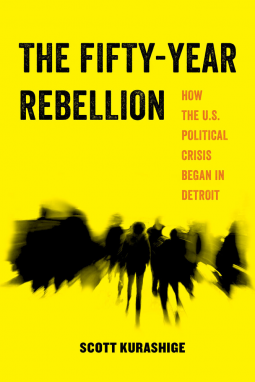
The Fifty-Year Rebellion
How the U.S. Political Crisis Began in Detroit
by Scott Kurashige
This title was previously available on NetGalley and is now archived.
Buy on Amazon
Buy on BN.com
Buy on Bookshop.org
*This page contains affiliate links, so we may earn a small commission when you make a purchase through links on our site at no additional cost to you.
Send NetGalley books directly to your Kindle or Kindle app
1
To read on a Kindle or Kindle app, please add kindle@netgalley.com as an approved email address to receive files in your Amazon account. Click here for step-by-step instructions.
2
Also find your Kindle email address within your Amazon account, and enter it here.
Pub Date Jul 04 2017 | Archive Date Apr 04 2019
Description
This title is part of American Studies Now and available as an e-book first. Visit ucpress.edu/go/americanstudiesnow to learn more.
On July 23, 1967, the eyes of the world fixed on Detroit, as thousands took to the streets to vent their frustrations with white racism, police brutality, and vanishing job prospects in the place that gave rise to the American Dream. Mainstream observers contended that the “riot” brought about the ruin of a once-great city; for them, the municipal bankruptcy of 2013 served as a bailout paving the way for the rebuilding of Detroit. Challenging this prevailing view, Scott Kurashige portrays the past half century as a long rebellion whose underlying tensions continue to haunt the city and the U.S. nation-state. He sees Michigan’s scandal-ridden "emergency management" regime, set up to handle the bankruptcy, as the most concerted effort to put it down by disenfranchising the majority black citizenry and neutralizing the power of unions.
Are we succumbing to authoritarian plutocracy or can we create a new society rooted in social justice and participatory democracy? The corporate architects of Detroit’s restructuring have championed the creation of a “business-friendly” city, where billionaire developers are subsidized to privatize and gentrify Downtown, while working-class residents are being squeezed out by rampant housing evictions, school closures, water shutoffs, toxic pollution, and militarized policing. Grassroots organizers, however, have transformed Detroit into an international model for survival, resistance, and solidarity through the creation of urban farms, freedom schools, and self-governing communities. This epochal struggle illuminates the possible futures for our increasingly unstable and polarized nation.
On July 23, 1967, the eyes of the world fixed on Detroit, as thousands took to the streets to vent their frustrations with white racism, police brutality, and vanishing job prospects in the place that gave rise to the American Dream. Mainstream observers contended that the “riot” brought about the ruin of a once-great city; for them, the municipal bankruptcy of 2013 served as a bailout paving the way for the rebuilding of Detroit. Challenging this prevailing view, Scott Kurashige portrays the past half century as a long rebellion whose underlying tensions continue to haunt the city and the U.S. nation-state. He sees Michigan’s scandal-ridden "emergency management" regime, set up to handle the bankruptcy, as the most concerted effort to put it down by disenfranchising the majority black citizenry and neutralizing the power of unions.
Are we succumbing to authoritarian plutocracy or can we create a new society rooted in social justice and participatory democracy? The corporate architects of Detroit’s restructuring have championed the creation of a “business-friendly” city, where billionaire developers are subsidized to privatize and gentrify Downtown, while working-class residents are being squeezed out by rampant housing evictions, school closures, water shutoffs, toxic pollution, and militarized policing. Grassroots organizers, however, have transformed Detroit into an international model for survival, resistance, and solidarity through the creation of urban farms, freedom schools, and self-governing communities. This epochal struggle illuminates the possible futures for our increasingly unstable and polarized nation.
Advance Praise
“Scott Kurashige’s wonderful, important book teaches us to read neoliberal crisis and austerity from below, as a reaction to forces of liberation that came before and continue today.”—Michael Hardt, coauthor of Assembly
"I believe Scott Kurashige's work will introduce a new generation of scholars, activists, intellectuals, artists, and citizens to what many of us have said for a while. The story of the 20th and 21st centuries is the story of Detroit."—Lester K. Spence, Associate Professor of Political Science and Africana Studies, Johns Hopkins University, and author of Knocking the Hustle: Against the Neoliberal Turn in Black Politics
"I believe Scott Kurashige's work will introduce a new generation of scholars, activists, intellectuals, artists, and citizens to what many of us have said for a while. The story of the 20th and 21st centuries is the story of Detroit."—Lester K. Spence, Associate Professor of Political Science and Africana Studies, Johns Hopkins University, and author of Knocking the Hustle: Against the Neoliberal Turn in Black Politics
Available Editions
| EDITION | Other Format |
| ISBN | 9780520294912 |
| PRICE | $18.95 (USD) |
| PAGES | 192 |



